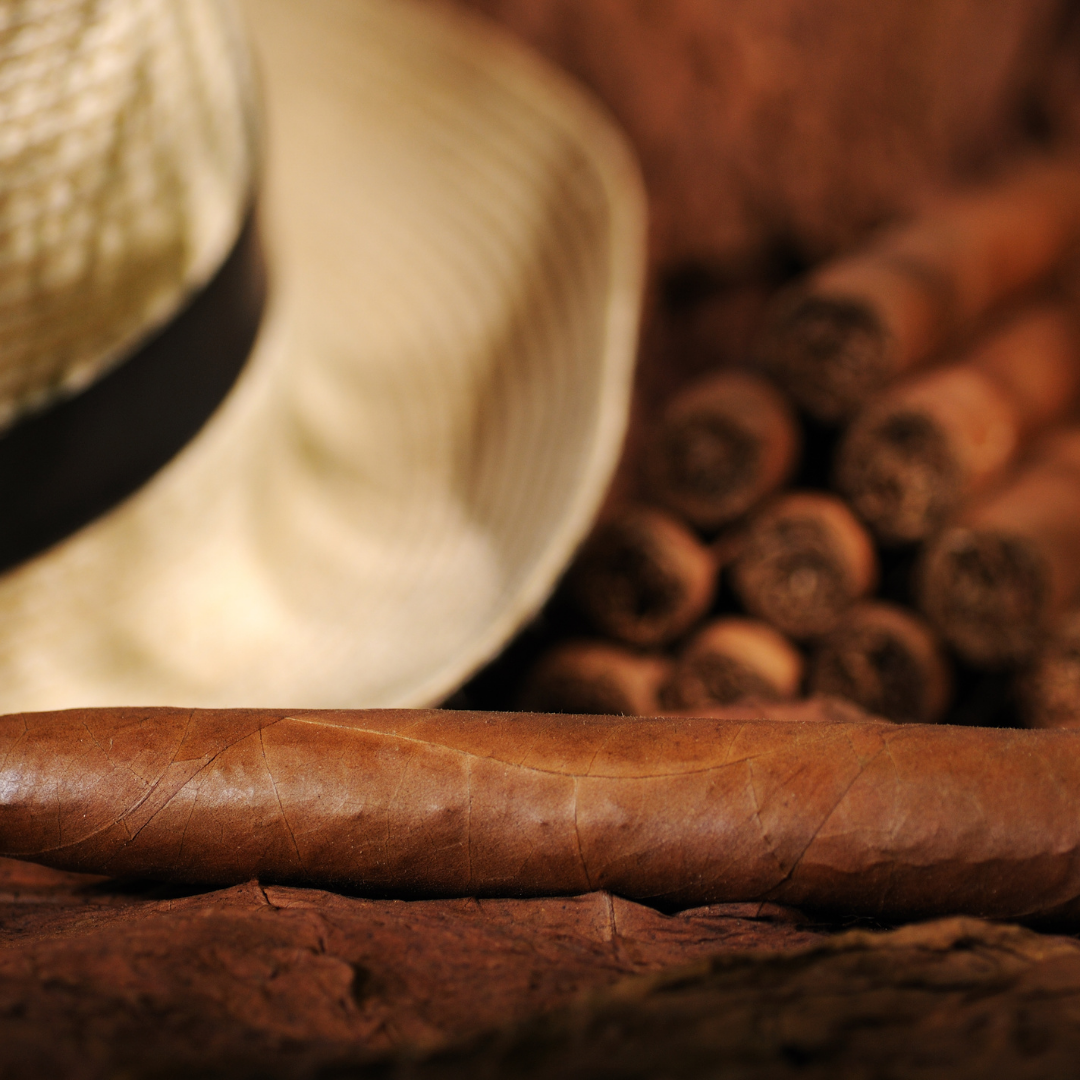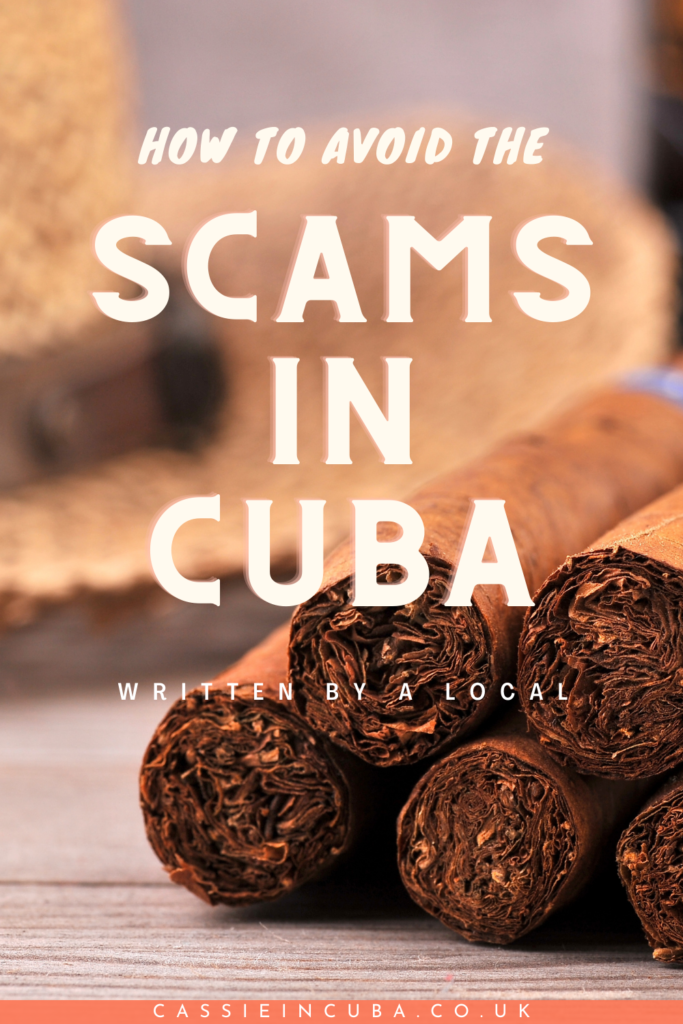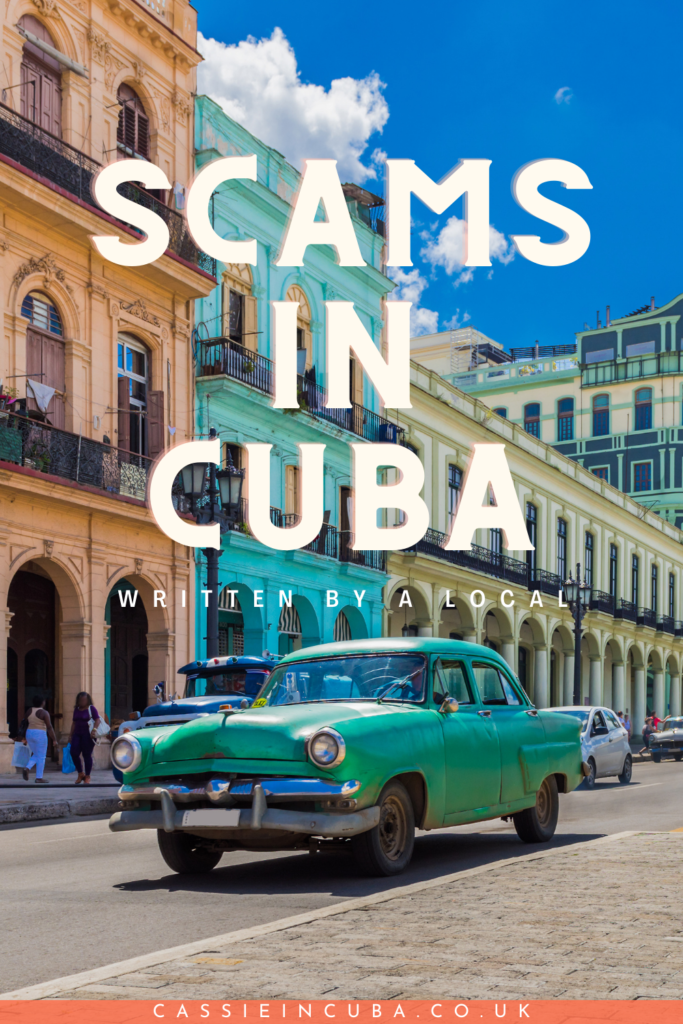
How to navigate scams in Cuba
Scams on tourists are extremely common in Cuba. Whether you’re male or female or anything in between, you’ll most likely come out of your Cuban trip with a new significant other, a branded box of Cohiba cigars made with banana leaves, and a lot less money in your pocket. It happened to me, it happens to so many. I’ve lived through it now and I’ve successfully come out the other side. And now I’m here to give you the inside scoop so you don’t repeat my mistakes. Ready? Read on.
Some posts on this site contain affiliate links, meaning if you book or buy something through one of these links, I may earn a small commission (at no extra cost to you).
Fake cigars
Naturally, the high demand for Cuban cigars has made the locals take notice. Many scams have been invented which you need to be aware of.
- When the ‘lovely’ owner of your casa particular in Havana brings out a branded sealed box “straight from the factory” and is selling at a fraction of the price – it’s fake.
- When the people on the street invite you to the ‘famous cigar festival just around the corner that only happens this weekend’ – it’s fake.
- When your ‘trusted’ taxi driver takes you to ‘his friends’ tobacco farm on the way into Viñales. It may or may not be fake, but he’s cutting a large commission.
Only buy your cigars straight from the factory, the government shops, or the (legal) tobacco farms. The latter is the best option. They’re artisanal and your money goes directly into the hands of the farmers. If you buy Cohiba/branded cigars, you’re essentially supporting the government directly.
Restaurant scams
Restaurants – mainly in Havana, it doesn’t tend to happen in Viñales – will often give you an “adjusted” bill that contains extra items you didn’t order. They particularly like to try this scam when you’ve been drinking and are less likely to notice. Also if they realise you don’t speak Spanish they can easily pull one over on you.
My advice to avoid this happening is to always pay after each round rather than running a tab. Keep a count of your food and drinks. Ask for the menu when you’re checking your bill so you can cross check.
Speaking of menu – often, especially in more rural areas, you’ll be given a menu but no price. Make sure you ask the price of the food. There is nearly always one price for Cubans and another for tourists. This is normal. Don’t expect or even try to get around this. It is how it is. You earn more than the Cubans, and this is their culture. And so it’s normal, but the least you can do is make sure that you know how much your food is before you order.
Also, some establishments will work with other locals (jineteros) who pose as friendly people welcoming tourists and inviting them inside to enjoy a drink or snack. The unsuspecting victim is then charged double or even triple the normal amount, the excess of which is split between the business and its “friendly” accomplices.
Being short changed
Check. your. change! Pre-2021, there were two currencies in Cuba – the CUP and the CUC. It was so easy to pay in one currency and be given your change in the other, worth significantly less. I saw it a million times. You’ll need to read this blog post specifically about the money system and always stay on your guard.
In January 2021 Cuba had a monetary reform and the got rid of the CUC. The current currency accepted in most places are the CUP (national peso) and the USD. This means less scams like the above, but the CUP is still a confusing currency so always check you change anyway.
Jineteros/jineteras
Jinetero/jinetera is the word to essentially describe a hustler. Originally this referred directly to the sex industry, but with the rise of tourism it has also spread to covering general scams on unsuspecting foreigners.
Essentially all of these scam scenarios I’m giving in this blog post are done by jineteros/as. I’ve mostly been writing about men because men are usually guides/taxi drivers. But there are female jineteras in the sex industry, casa hosts who will go out of their way to scam you, and on the street.
One very common female scam is when you see a poor lady outside a shop carrying a baby and she asks you to buy powdered milk. It’s a scam, don’t be fooled. You will buy her powdered milk and be on your way, but she will go into the store, return the powdered milk having made her commission (being in cahoots with the cashier, of course), and repeat the scam over and over.
There are an immeasurable amount of scams done by jineteros/as. The scope of their work could range from something quite insignificant to something totally life changing, so be on your guard (especially when it comes to being romanced by one – you’ll want to read my post on How To Date a Cuban, I talk about my relationship with a jinetero).
Car rental
This is a little known one. If you’re thinking of renting a car (as in, a modern Rent-A-Car, not renting a driver in a classic car), firstly – don’t, it’s not worth it. Secondly, if you do, do not stop on the motorway even if you think an official is waving you down. Seriously, just keep driving and pretend you didn’t see them.
Basically when you’re driving down from Havana to Viñales, you’ll go under a bunch of bridges where Cubans are congregating. They’re waiting for a bus or for a car to pick them up (hitchhiking, essentially, but paid in CUP).
If you’re a tourist in a Rent-a-Car, various uniformed official-looking Cubans will try to wave you down. They are not real officials – they bought/hired/borrowed the clothing and are just regular jineteros (see above).
They will speak rapid Spanish to you, give you some excuse like “my grandma is in hospital in Pinar del Rio and you need to take me there, it’s an emergency”. They will get in your car, make you feel very nervous, and then direct you to a tobacco farm. They will urge you to buy cigars because they’ll take a large commission. If it’s not a tobacco farm, it’ll be a restaurant, or basically anywhere they’ll make money off you.
Don’t fall for it, keep driving, if an actual police car stops you, then you should stop.
Taxi colectivos (shared taxis with other tourists)
These used to be great and the most popular way of travel around the island (and they’re for tourists, mainly). The current reality? They’re a nightmare. They’re rife for scams as well as being uncomfortable, cramped, with often questionable driving skills. And they take twice as long for the journey.
The colectivo drivers take you door to door, so when you arrive in your destination town and tell them your casa particular details, be careful. They often take you to another one but make you believe it’s the right one. Why? Because they want their commission from taking you to their friends casa, of course.
Colectivo drivers on their way Viñales will also 95% of the time take you to a tobacco farm on the way in to the village. Please, say no. Not only are your casa hosts waiting for you and losing hours of their day whilst your driver goes rogue, but also the only reason the driver is taking you there is because he wants the commission from whatever you buy. It’s all hustle. If you buy products there, so so often the cigars are fake (they will the cigars with banana leaves instead of tobacco leaves). But also the people who do the hard work and rely on your purchases as their living, will be out of pocket. Instead, you gave even more money to your taxi driver who already makes a pretty decent salary.
Wrong casa/guide
If someone flags you down in the street and helps you ever so kindly with directions – they can’t always be trusted. In fact, just don’t trust them. They will often say “oh yes I know where it is”. They will then take you to their mates house where everybody is already in on the plan. The mate will even pretend their name is the name you have written down for your host, and you’ll end up somewhere you’re not supposed to be.
This is the same with guides. Let’s take Viñales as an example but it will happen island-wide: whether you come for the day with your own taxi driver (read this first), or you’re already in Viñales and making your own way to your pre-booked excursion, be aware that everyone will claim they’re your guide.
“Chica chica, who do you look for?” “Juan” you reply. “I AM JUAN!”. You’ll get on ‘Juan’s’ horse, ride to ‘Juan’s tobacco farm’, and basically have a totally fake experience with some random person you know nothing about. Why do they do this? Because, even if you already paid on AirBnB Experiences, they hope that you will buy something so they’ll take the commission. Hustle!
So, how to stop the above happening? Organise your accommodations/transfers/excursions with the same company or person. Know your rough plan before you travel. Have your wits about you if a random person approaches you trying to help, and ideally have a photo of the real host/guide.
Did you find this post interesting? I’d love for you to support me and share it.
Pin and save this blog post for later




You May Also Like

How To Work Remotely From Cuba in 2024
June 17, 2024
Best time to travel to Cuba
July 15, 2020